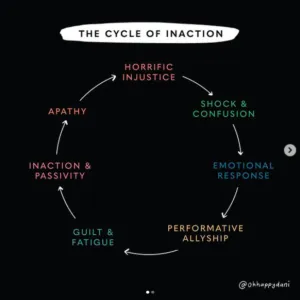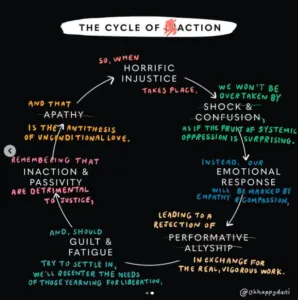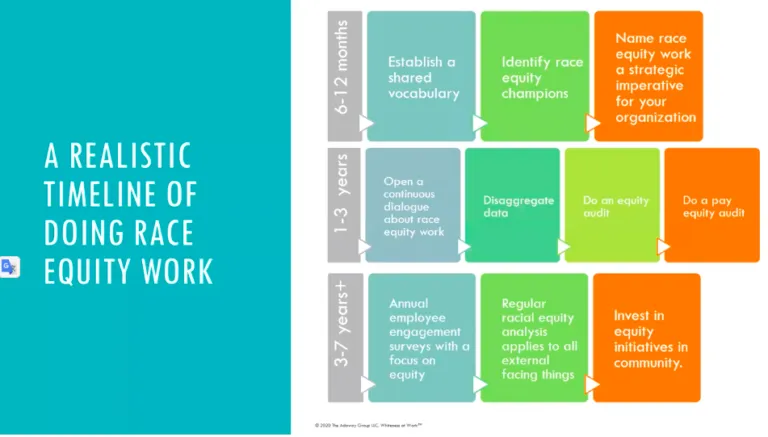Anti-Racism: holding ourselves to account
Published: by Anti Racism Steering Group

We must reject performative gestures and do the work.
Last year we outlined seven ways Shelter is working to dismantle systemic racism and become an Anti-Racist organisation. We are ten months into our anti-racist journey and that list of actions has grown significantly, so we would like to share where we are so far and what’s still to come.
No one at Shelter is an expert in anti-racism. We are learning, unlearning and building as we go. We welcome being held to account by the people we help and our supporters, and we encourage everyone at Shelter, including those in leadership roles, to allow themselves to be held accountable and listen and learn from those who have been doing the work.
Cycle of inaction
Artist Danielle Coke explains what a cycle of inaction looks like: horrific injustice leads to shock and confusion, followed by an emotional response. Here’s the crucial point: performative allyship. You likely saw examples of performative allyship during summer 2020 when many, understandably, declared their rejection of social injustice. Despite good intent, without meaningful action it is easy for guilt and fatigue to settle in, leading to inaction, passivity, and apathy.
Here is what we’re doing at Shelter to avoid this cycle.
Rejecting performative allyship
While our ambition to be anti-racist has been met mostly with positivity and some cautious enthusiasm, there are some who are concerned that it’s performative. We are a housing and homelessness charity; why is anti-racism so important to fighting the housing emergency?
The fact is, a person’s identity has an impact on their access to safe, secure, affordable homes.
A 2020 literature review carried out for Runnymede Trust shows that while there are gaps in recent evidence and data – housing and race haven’t been the subject of campaigns for better data in the same way health and employment have – there are clear drivers of housing inequality for people of colour. Through our DSS Discrimination campaign, we have proved in court that sex and disability impacts access to a decent, affordable home. Research by The Albert Kennedy Trust estimates that one-quarter of all homeless people under the age of 25 are LGBT and found that 69% of them have experienced familial rejection, abuse and violence.
There’s clearly a need for us to understand how identity impacts the people we help and their housing issues. We’ve begun by looking at sector-wide best practice for data sets, and considering the support we need to offer colleagues to collect this information in a consistent and sensitive way. We’re also working closely with Shelter’s LGBTQ+ Network to ensure that, as well as ethnicity, the data collection includes a number of protected characteristics such as sex, sexual preference and disability.
As an organisation, we lacked an understanding of how people experience racism at Shelter. With the help of The Unmistakables, we conducted an anti-racism survey with Shelter staff and volunteers, and plan to survey our clients later this year. Some key themes to address have emerged from the staff survey, such as psychological safety at work, the lack of diversity within leadership teams and lack of inclusivity of our culture. We must not deny or minimise these findings. They’re unacceptable and we are now working across the organisation to make strategic changes to address these findings. We look forward to sharing an update with you in the near future.
Going forward we will create moments of staff celebration and learning as a vital fixture, not an optional add-on. During Black History Month we engaged with a month-long programme of activities, including talks facilitated by Dr Victoria Showunmi, featuring special guests: barrister, poet and spoken word artist David Neita, and author, academic and professor of Black studies at Birmingham City University Kehinde Andrews. The chair of our Anti-Racism steering group sat down for a discussion about representation with Selma Nicholls, the founder of Looks Like Me, a diverse and inclusive casting agency. The conversation with Selma was hosted on Shelter’s internal network for staff to engage with. We also held a Day of Learning, where everyone at Shelter was invited to shut down their emails and participate in a full day of learning and reflection to cement our dedication to the cause. We were extremely pleased to work with consultant and #CharitySoWhite organiser Martha Awojobi to get the most out of the day, in which we heard from guest speakers, got into uncomfortable but necessary discussions, and collectively set our commitment to tackling systemic racism.
Recognising the risk and impact of guilt and fatigue
It’s not enough for an organisation to agree that racism is bad. It takes work – real work – from everyone involved to become actively anti-racist. Recognising and addressing the impact of this work on individuals is vital to keep the work going.
There’s an irrefutable mental and emotional impact on people of colour in the workplace. Engaging in this work can set off racial trauma. Blurred lines between a person’s identity and their work lead to emotional and mental labour. For example, during the shock and confusion of summer 2020, there was a rush at Shelter to act before we had taken the time to analyse, which was done so at the expense of staff members, mainly people of colour already doing the work. There are also colleagues who may be recognising – perhaps for the first time – their own role in upholding and benefitting from racism, and are dealing with feelings of guilt.
Guilt can be harmful to anti-racist efforts because it leads to hasty action, often without listening to the needs and recommendations of people of colour. Everyone, including those in leadership, must learn to take a step back, to listen to and empower those who have been doing the work. Sitting with your guilt, acknowledging that you are not the expert and listening to others is vital.
At Shelter we’ve taken a number of measures to reduce the risk and impact of fatigue and guilt on our colleagues including expert training, affinity groups, mental health support, and resourcing the work properly.
Staff have been encouraged to work through the Adaway Group’s Whiteness at Work modules, helping us build an inclusive workplace. This helps participants to explore racism in the workplace in a structured way, and sets aside time each week to discuss and work through the learnings with colleagues. You can find the first module online here.
Affinity groups are where Shelter employees with a common interest or goal come together to create a safe space to share their experiences, or use strength in numbers to solve particular issues. The People of Colour (PoC) Affinity group has been created as a support network and safe space for Black and Brown colleagues across the charity, while the Ally Affinity group has been created to help employees develop awareness and education in the area of anti-racism. These groups aren’t working in siloes but come together to discuss the issues through a lens of intersectionality. For example, a recent joint session between the Ally group and Shelter LGBTQ+ group explored issues faced by people of colour in the LBGTQ+ community.
Shelter’s team of Mental Health First Aiders, trained by MHFA England, have undertaken specific training in racism and supporting people of colour. We are also exploring ongoing wellbeing initiatives to support people of colour.
Finally, we’ve recognised the importance of not being purely reactive to moments of horrific injustice. It’s unsustainable for any organisation – indeed, any individual – to operate in this way. Instead, we’re being proactive by working to make anti-racism part of our everyday work instead of an add-on, and we are now ensuring the work is budgeted and resourced accordingly.
Avoiding inaction, passivity and apathy
This work signals a culture change at all levels of the charity. It deals with issues that are deeply personal, which makes the work messy and challenging.
It’s important that everyone at Shelter can see and measure the work being done, and feels included. Everyone is at a different point in their journey, some can’t yet see anti-racism as central to their own roles – or even to their lives – right now, which can be a barrier to achieving the goal. Without tangible evidence and an understanding of the work, people may struggle to see how active, urgent, and positive anti-racism is.
Internally, we’re providing regular updates to all staff on our progress and putting together a communication plan to reach all areas of the charity. Externally we have committed to regular blog updates, and to fostering an online community that does not tolerate hate speech of any kind.
We’re working with The Unmistakables to conduct an audit of how we communicate: online, in the press, in the post and more, to assess how diverse and inclusive our communications truly are. There are also plans to ‘pass the mic’, and use our platforms to amplify housing groups that are run by, and for, marginalised groups.
In recruitment, we are trialling more equitable processes to candidates applying for roles to ultimately create a more inclusive and accessible organisation. Last year one of our fundraising teams set out guidelines for hiring managers, including showing the salary, not requiring a university degree, streamlining the process into fewer stages, and providing interview questions in advance. We’re also using BAME specialist recruitment partners and advertising new roles in more targeted outlets.
Finally, we’re being realistic about how long this work will take. The timeline below is provided by the Adaway Group and gives a credible roadmap to achieving anti-racism. It’s by no means a strict guide; there’s a shared understanding that we’ll all take the time needed to do this properly. Through our Theory of Change work with futurist, cultural strategist, keynote speaker, and artist Adah Parris we are developing a roadmap for everything we aim to achieve in the short, mid and long-term. We’re looking forward to telling you more about our strategic plan for becoming anti-racist.
Three ways you can help today
The first way you can help is by reading this blog on why people of colour are disproportionately impacted by the housing emergency, and read How To Be An Anti-Racist by Ibram X. Kendi. Understanding the issues is key to solving them. Share and discuss them with your networks, and keep checking in with our blog to stay up to date on the latest in the housing emergency and our mission to become anti-racist.
The second way to help is by supporting inclusive and diverse organisations that are run by and for people of colour. We recommend Sistah Space, The Black Curriculum, Charity So White, and BLM UK, but that is by no means a definitive list. Find more groups and amplify, especially if you’re a white ally. Amplifying people of colour into your networks helps conversations progress.
Finally, don’t aim for perfection: aim for progress. Undertaking a major culture change to become anti-racist is not comfortable or easy. It is real work that requires time and bravery. Accept that you are learning, that you are unlearning and that you will make mistakes. And before you do make mistakes, learn how to apologise in a way that centres on the impact rather than the intention.
Good luck, and thank you for your support.


